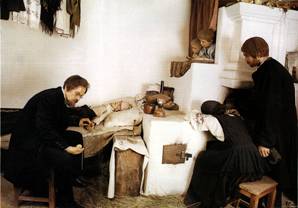 A NOSTALGIC LOOK BACK
A NOSTALGIC LOOK BACK
by Barbara Holland
When I was a child the doctor was God. Like God, in exchange for respect and obedience—”doctor’s orders”—he guided us through the valley of the shadow, held out the hope of life eternal, and came when we summoned him, yea, even through snowstorms, to sit on the edge of our bed and lay his hand on our fevered brow.
Our parents were wise by definition but he was infallible by definition; “The doctor knows best” was an incantation you could lean on. We trusted him utterly. Like God, he was the safety net forever spread under our precarious lives. Like God, he was the powerful superparent standing backup behind our mortal parents, appearing as if by magic when our mother’s remedies failed, black bag in hand: “Well, well, what seems to be the trouble? Let’s have a look.”
In the days before the all-purpose antibiotic, it was important for the doctor to figure out what ailed you, and this he did, not in the lab, but sitting on your bed. It was an art form as much as a science and a clever diagnostician was much admired. He touched your skin and lifted your eyelids and peered down your throat; he flexed your knees and elbows and thumped your back. He unbuttoned your pajamas and listened to your heart and lungs. His interest was inexpressibly comforting and most people felt better almost at once. Even if his bedside manner was brusque and his voice tired and impatient, that couldn’t disguise the love he bore us. The love was implicit in his coming; why else would he be at our side? I’m sure I wasn’t the only child who wept upon learning that he charged money for his services, but even that didn’t shake my faith in his love.
In nineteenth-century novels the heroine’s grave condition was underlined by the number of doctor’s visits per day. It’s never clear exactly what he was doing on these visits, but visit he did, and often the languishing lady cheered up, sipped a little beef tea, and recovered. Back then, illness was a more personal matter. It was said that those with a “strong constitution” would pull through, while the naturally sickly and patients whose constitutions had been previously undermined would turn up their toes and die of a fever like Sweet Molly Malone. Even those who believed in germs didn’t give germs much credit; violent emotional scenes or fits of passion might throw a person into a fatal fever, at least in novels. The doctor stood by, lending the constitution moral support, shoring it up with a change of air, a change of scene, an ocean voyage.
Temperament was a factor. Some patients, often young ladies disappointed in love, simply wasted away, while others went into a decline. Older men were more likely to be carried off by apoplexy, or sheer bad temper, and young men who read and studied too much were subject to death from brain fever. Many patients were described as having “taken to their beds,” thus becoming bedridden; being bedridden was apparently a recognized disease in itself.
For the first half of the twentieth century, the doctor cured us with aspirin, orange juice, bed rest, and the laying-on of hands. If we worsened, he put us in a hospital where we stayed, complaining about the food, until he was quite satisfied with our condition. (Then he sent us bills, or sent them to our family if we perished, and the phrase “doctor’s bills” rang ominously, and the impecunious often took years to pay them off.)
Medicine has made tremendous strides since then, and by rights we should worship our doctor more fervently than ever, but somehow we don’t. He never comes to see us anymore. Sometimes he doesn’t bother to discover personally exactly what’s the matter by inspecting our ailing bodies; if for some reason he needs to touch us, he first puts on latex gloves and a mask. Then he writes a prescription that should cure whatever it is, and if that fails, he orders lab tests. He maketh us to fill out daunting piles of paper that look like tax forms. Rumors circulate about his income, comparable to sports stars’; sometimes we think he might be healing us as much for money as for love. He’s a quitter, too, and when we seem really sick he thrusts us away from him, sends us off to a specialist we’ve never seen before. Indeed, we may never have seen our doctor himself—now called a health-care provider—before.
Back in 1990, a few people were suggesting that we take up some kind of national health insurance, like that provided by all other civilized countries, but the resulting outcry approached mass hysteria. It would mean the end of that warm, close, caring relationship between doctor and patient, so essential to therapy; it would mean we might see a doctor who didn’t remember when we had chicken pox. The national-health movement slunk away with its tail between its legs, and the very next day was replaced by something called health maintenance organizations. Under these, assorted providers are assigned to groups of patients, and the less the providers do for the patients, the richer they get. Accountants decide what absolutely must be done and what can be skipped. Nobody complains about hospital food anymore; perhaps hospitals no longer need to serve food, since all the patients are sent home before dinnertime. Consumer advocates urge us to get tough with our provider organizations, demand our rights, and stomp out in a snit to try elsewhere, but this is a lot to ask when we’re wobbly and feverish, or perhaps unconscious.
Since doctors no longer talk to us by phone, offering advice and consolation and prescriptions free of charge, some conscientious providers have now gone on-line, so we can share our ailment with our computer. (“If temperature is elevated, click here.”)
It’s lonelier to be sick now, and scarier than it used to be, and millions of us have turned our backs on the new doctors and searched out Chinese women with needles, massage therapists, manipulators of joints, chanters of mantras, and purveyors of roots and barks and herbs and essential unguents. They seem friendlier. The shamans and wiccans with cures from the woods and ditches are more reassuring than the doctor himself, who has turned so cold and uncaring and who may not be God after all.
In the great yellow fever epidemic in Philadelphia, in 1793, the famous Dr. Benjamin Rush saw well over a thousand patients, bearing the cure he’d invented and believed in passionately. His treatment consisted of ripping their guts out with mercury purges and draining off most of their blood. This savage remedy should have killed them all, even if they hadn’t been already sick, but an astonishing number survived and flourished.
He had tremendous confidence and courage. He strode into their evil-smelling chambers and sat on their vomit-soaked beds and smiled and said, “You have nothing but a yellow fever.”
Probably they trusted him. Probably they thought he was God, and loved them, and it would be ungrateful and impious of them to die.
More of us stay alive today under the tender care of the antibiotics that replaced the doctor. We must learn to feel the same respect and trust for our bottle of pills, and smile weakly but gratefully at it when it comes to our bedside. Press it to our fevered brow, this pharmaceutical father figure squeezed into a plastic tube, with two refills and possible side effects but comforting, powerful, and wise. And probably very soon now medical science will have the bottle programmed to murmur, when we pry off the lid, “Well, well, what seems to be the trouble? Let’s have a look.”
 Dzobak Volodymyr
РОЗДУМИ ПРО НАДВАЖЛИВЕ або ЧОМУ НАШІ ОЛІГАРХИ СТАЛИ МОГИЛЬЩИКАМИ НИНІШНЬОЇ УКРАЇНИ
Dzobak Volodymyr
РОЗДУМИ ПРО НАДВАЖЛИВЕ або ЧОМУ НАШІ ОЛІГАРХИ СТАЛИ МОГИЛЬЩИКАМИ НИНІШНЬОЇ УКРАЇНИ




 A NOSTALGIC LOOK BACK
A NOSTALGIC LOOK BACK